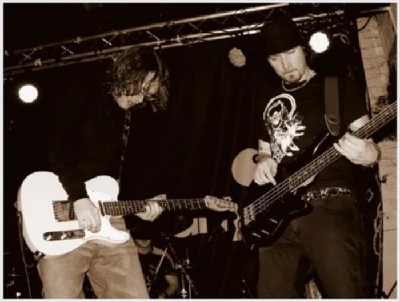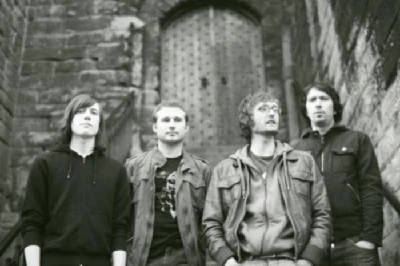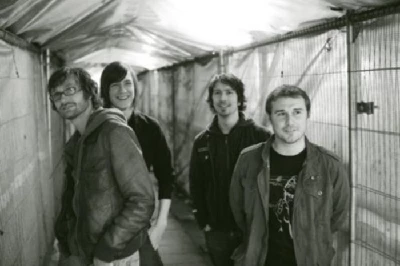published: 16 /
2 /
2008

Newcastle-based dance/rock outfit Deltasound have been together for just over a year. Vocalist/guitarist Jonjo McNeill and bassist Adrian Huggins chat to John Clarkson about their first two EPs, and what gave Jonjo having given up making music the inspiration to start up again
Article
Jonjo McNeill had abandoned making music.
He formed his first band, Lynam, an anthemic indie guitar outfit for which he played guitar and sung lead vocals, as a first year university undergraduate student in Sheffield in 1999.
In 2002, the year in which its members graduated, the group moved to London in search of a record deal. The shift from a relatively small city with a population of 500,000, in which everyone on the independent music scene knew nearly everyone else and where Lynam had met with some local success, to a metropolis of over six million, in which no one had ever heard of them and there were hundreds of groups in a similar situation, proved harder than everyone had imagined. Gigs were difficult to find. Contacts were even more elusive. The band changed its name to the Lazarus Effect and added a fifth member, another guitarist, but it had little impact. As the other members of the group got long-term girlfriends and became immersed in their day jobs and starting mortgages, the Lazarus Effect fell into inactivity. Jonjo, disillusioned and jaded, went home to his native Newcastle for the weekend in the spring of 2005. He didn’t bother coming back.
"I was completely uninspired by making music. I gave it all up when I moved back to Newcastle", he says, talking to Pennyblackmusic with his band mate, bassist Adrian Huggins, about their new group, Deltasound.
It was hearing a dance track on the radio that finally sparked off his enthusiasm again, and re-started him writing music after an absence from it of eighteen months.
"I can’t even remember which tune it was", he reflects. "It was something by the Crystal Method though and there were no guitars on it. I thought that you could do that with a guitar as well."
"A lot of people you meet who are trying to form a band just want to make straight indie rock. I am not interested in doing anything like that anymore. I decided I wanted to take elements of dance music and make songs out of them with real instruments.”
“I love the idea of people dancing at gigs instead of just standing there and looking bored. If you go and see most bands, they might be absolutely amazing, but in most cases you end up just standing there. People, however, dance at our shows."
Deltasound formed in late 2006. Jonjo (27) initially recruited Adrian (24) , who he had become friends with after they had met when they had both worked as temps in the same office in 2002. They spent Deltasound's first few weeks working with another musician, but when this didn't work out, after advertising on the internet, added to the line-up another guitarist, Andrew Ridley(19) ,and a drummer, Craig Hutchinson (28). Adrian, Andrew and Craig's previous musical experience had all been confined to jamming with friends.
Deltasound's five song debut EP, 'EP1', came out last summer and was described by Pennyblackmusic at the time as "a glorious merging of stop-start guitars, crisp funk beats and bubbling studio effects."
A second three song EP, 'EP2', has just been released. It is of a similar sound, but shows a band which in the six months since its four members were last in the studio, has become much tighter and which, with Adrian's choppy bass lines and Craig's taut drum beats both having a still greater focus, has grown rapidly more confident.
Like the Lazarus Effect, there is an anthemic quality and anger to Deltasound's music. Opening track, 'Attachment', warns its listener against taking quick-fix solutions to both personal and political situations in which there are no real easy answers. Slipstream' rails against the increasingly dishonest British press and media and 'Psychodelic' is a rallying cry whatever the pressures are to conform to the set rules of society, for people not to relinquish their dreams. Yet while the Lazarus Effect often simply blustered with anger, Deltasound, with their deep underlying funk grooves, are a much more positive, even cathartic experience, encouraging their audience to take their collective fury at the stupidity of the world and then, however temporarily, to absolve it by dancing away their anger.
"We normally get some kind of groove down first”, says Jonjo, explaining the collective song writing approach of the group. "In the case of 'Attachment', for example, Craig and I jammed out the introduction while the others were away getting cups of tea and then they came back and joined in. We tend to get the bass and drums parts done first of all. There has to be a groove there or it just sounds like rock music."
"We got back and they were playing this riff and we started playing along with them", recalls Adrian, taking up the story. "I came up with my part and then I developed and changed it. Then Craig altered his part in concordance with me and Andrew did his own thing over the top of it."
"We will get a basic song together and then I'll take it away and write some lyrics to go with it," Jonjo concludes. "The lyrics might already have been written previously with no actual music in mind, but those and also the melody both are always added after the groove.”
Deltasound have spent much of the last year working to a military-like schedule, rehearsing and practising often as much as four times a week, and since their first gig in February 2007 have played over 40 shows, which has taken them as far south as Sheffield and north as Glasgow.
“A lot of that has been to get our name out”, says Adrian. “And also to get some experience as a group of stage work, because every time you’re on stage you learn a little more and become a bit tighter. I don’t think we would have got to where we have got now if we had not done that.”
Deltasound have taken some often unusual steps to promote themselves, including playing last November to one of their largest audiences to date from their manager’s garden.
“It was bonfire night”, explains Adrian. “And our manager, Al, said ‘There is a big fireworks display opposite my house in Whitley Bay. Why don’t you play in my front garden because there will be a lot of people there ?’. We all went, ‘Oh, that’s a silly idea’ and we hummed and hawed about it, but eventually turned up and it was brilliant.”
“We started off with just a few people watching us set up” laughs Jonjo. “Probably most people who were passing were thinking, ‘Who are these idiots ?’, but by the end of our set we had literally hundreds of people watching us. We ended up having to go out again at the end of it and to do an encore as they wouldn’t go away.”
A bizarre set of circumstances now seem set to lead the band this summer to America to play a festival with the same name as the group.
“A very good friend of mine is at university in Miami”, explains Adrian. “And the main fraternity there are called the Delta something or other, and they put on twice a year this music festival for the university called the Delta Sound. My friend saw this and he bumped into the main guy who runs this festival and said, ‘Well, actually my friend is in a band and they are also called Deltasound’ and gave him a CD. He liked it and it now looks as if we are going over there.”
“If we do go over there which is looking likely we thought that it would be a waste of time to do just one gig”, reflects Jonjo. “They have said that they will pay our air fares and it is not often that people offer to do that for you, so we’re going to go around a few places and do five or six shows and play a few towns.”
Deltasound’s immediate concern, however, now is to record an album. They won’t, however, be chasing a record contract, preferring, as with the two EPs, to self-release it.
“I think the Lazarus Effect were foolish chasing a record deal now”, admits Jonjo with the wisdom of hindsight. “If we had got one, whichever label we were signed to would probably have only tried to mould us anyway. Deltasound aren’t going to do anything just because we think it is going to tick someone’s boxes. We won’t change what we do, cut a song down to half its length so that it can be played on some crap radio station or whatever. We’re not interested in doing that. We think our music is great and it is better to take it as it is.”
Adrian, who works for a local music PR firm, is even more scathing about the prospect of signing to a record company.
“You see a lot of bands that are clearly in it because they want to be in a band and who are not even really that interested in music”, he reflects. “They think that if they do the promotion and radio and press and do as their record companies tell them that give it six months they’ll be on the front of ‘NME’. You quickly release that the best bands work through that and don’t think about it that way. It seems pointless chasing a record deal and getting into debt by being given a big fat loan by a company that is going to try and make you be something that you don’t want to be anyway.”
“It would obviously be incredible if we could tour for a living”, Jonjo considers, when asked about what the band’s hopes are for the future. “Our audience is building, but we have got no real expectations. We do a lot of free gigs locally because we enjoy playing live so much and would be happy though if it was practical and we could playing every single night for nothing as well.”
“We really love making the music that we do,” he says in conclusion. “The music that we play I listen to quite a lot myself. It is exactly what I want from music. I am enjoying playing in this band more than I have ever enjoyed playing music in my life, and really that is good enough for me.”
Jonjo McNeill and the rest of Deltasound are obviously having a fantastic time, avoiding the pressure of worrying too much about what the future holds for their band, enjoying each new development as it comes and making music that they believe in. One gets the impression that he won’t be dropping out of making music again in a hurry.
Picture Gallery:-

